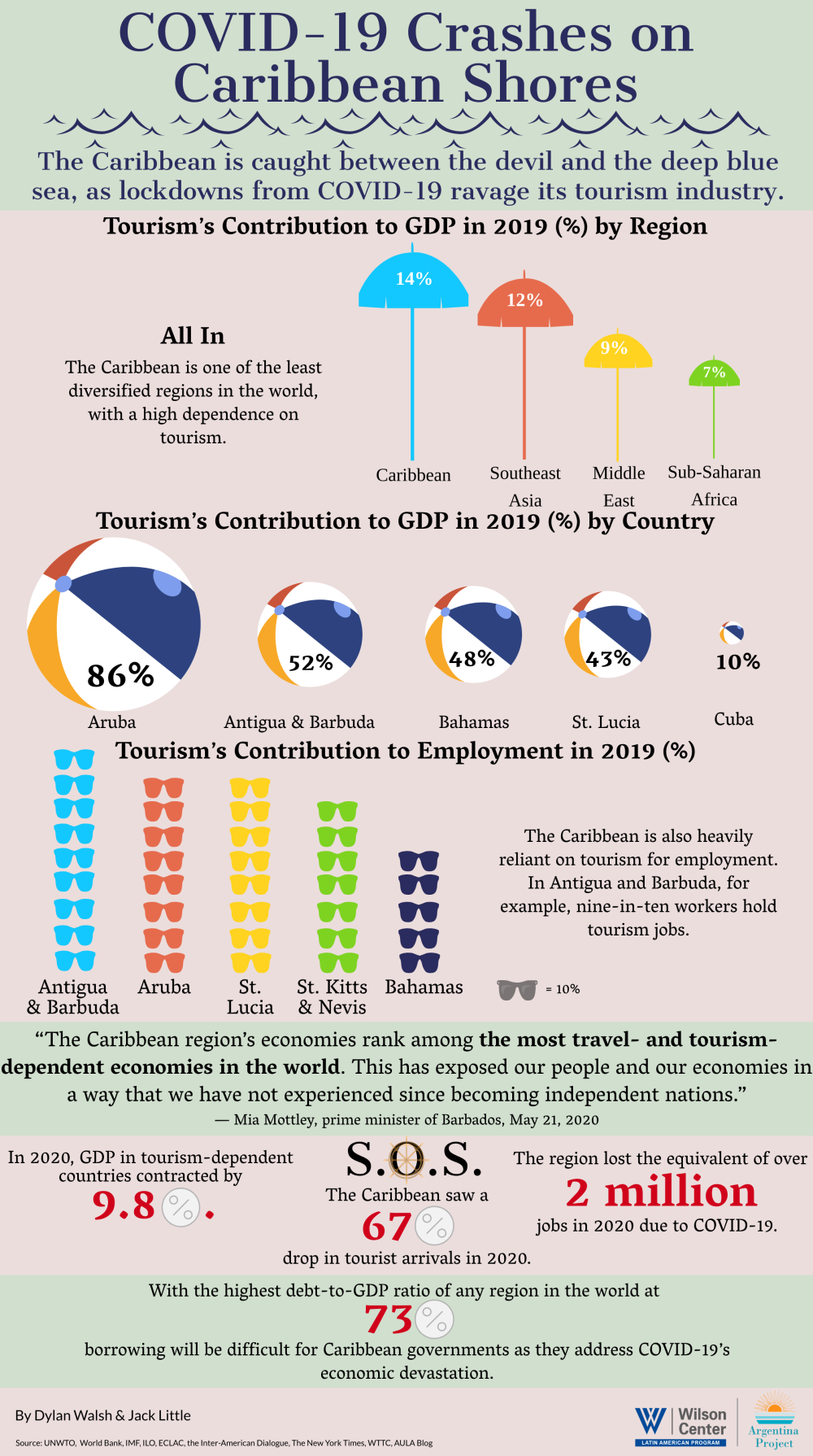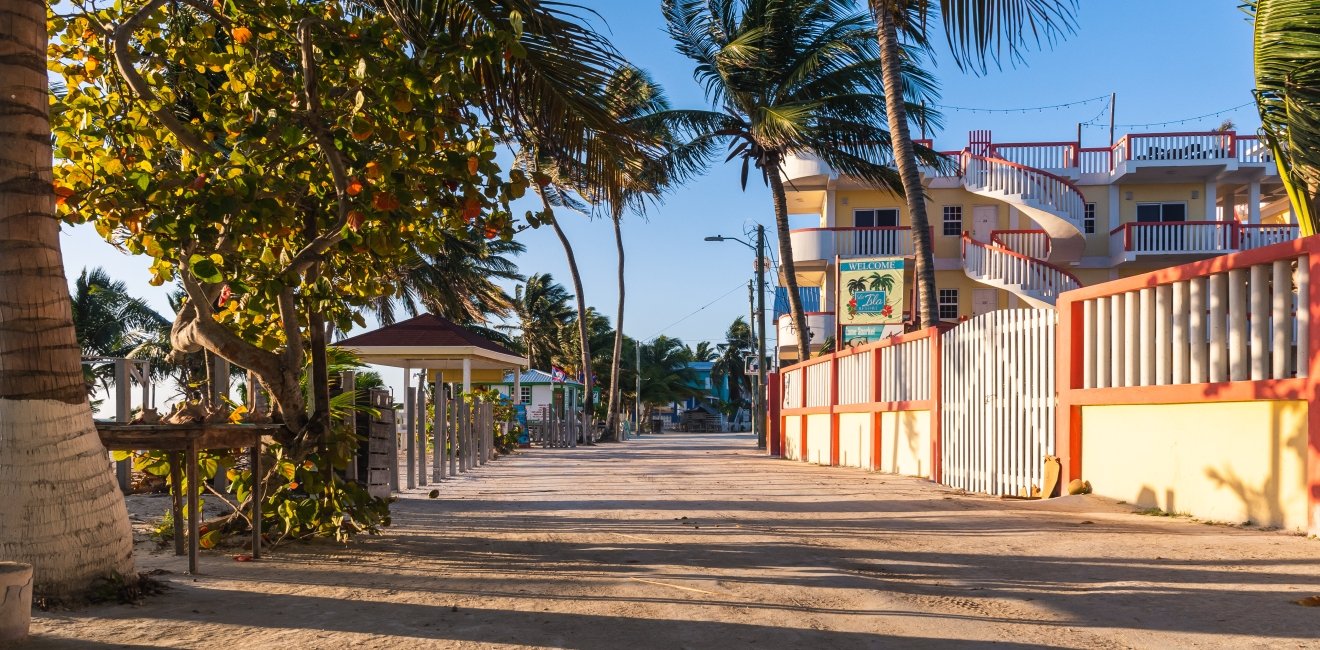
A blog of the Latin America Program
An Unwelcome Visitor: COVID-19 and the Caribbean’s Tourism Collapse
By Jack Little
Latin America is the world’s hardest-hit region by COVID-19, and by far the hardest-hit part of Latin America is the Caribbean, where islands dependent on tourism have seen their economic lifeblood evaporate overnight.
The Caribbean’s GDP contracted by 9.8 percent in 2020, compared to a 7.4 percent contraction regionwide. That devastating collapse was a product of the Caribbean’s failure to diversify economic activity. Indeed, it is one of the least diversified parts of the world, with tourism accounting for 14 percent of GDP in 2019, the most of any region. This is especially true in Aruba, Antigua and Barbuda, and the Bahamas, where the steep reduction in pandemic-era travel battered the hospitality industry.
The initial shutdown in international travel was bad enough; tourism arrivals in the Caribbean fell by 67 percent in 2020, according to UN data. Despite the start of vaccination campaigns, however, international travel is recovering far slower than Caribbean leaders had hoped. As a result, the International Monetary Fund (IMF) lowered its 2021 projected growth rate for the Caribbean from 4.0 to 2.4 percent, compared to 4.1 percent regionwide. The pandemic has also ballooned joblessness. Tourism accounts for 2.8 million jobs in the Caribbean, about 15 percent of total employment. In all, the Caribbean lost more than 2 million jobs due to COVID-19 in 2020, according to International Labor Organization estimates, many of them in the tourism sector.
“This has exposed our people and our economies in a way that we have not experienced since becoming independent nations more than 50 years ago,” Barbados Prime Minister Mia Mottley said.
As Latin America battles a second wave of the coronavirus amid a slow vaccination campaign, recovery in the Caribbean will be difficult. Several popular tourist attractions – such as the Dominican Republic’s 400-room Excellence Punta Cana resort and Jamaica’s 400-acre Half Moon resort – temporarily closed last year. Others, like St. Kitts’s 50-room Ocean Terrace Inn, have shut their doors for good. Some Caribbean countries, such as the Dominican Republic, are getting creative in their marketing pitch, including offers of free COVID-19 testing and discounts at tourism-dependent facilities. The Aruba Hotel & Tourism Association is offering discounted rates to travel agents in exchange for promoting their visit to Aruba on social media. For its part, St. Lucia invested $1.8 million in the Anse La Raye village in October 2020, as part of its Village Tourism project, which aims to draw visitors to less popular areas of the country.
But tourism will not durably rebound until the region gets the virus under control. For now, the Pan American Health Organization says the hemisphere is “in the midst of a worsening outbreak” and the coronavirus continues to island-hop in the Caribbean, where daily case numbers are rising in Aruba, Cuba and Bermuda. To make matters worse, highly indebted Caribbean governments have few resources to keep their economies afloat. The Caribbean has the highest debt level in the world (73.3 percent of GDP), making borrowing costly. This means the Caribbean will not get back on its feet until its beaches and pools are filled again, whenever that might be.

Author


Latin America Program
The Wilson Center’s prestigious Latin America Program provides non-partisan expertise to a broad community of decision makers in the United States and Latin America on critical policy issues facing the Hemisphere. The Program provides insightful and actionable research for policymakers, private sector leaders, journalists, and public intellectuals in the United States and Latin America. To bridge the gap between scholarship and policy action, it fosters new inquiry, sponsors high-level public and private meetings among multiple stakeholders, and explores policy options to improve outcomes for citizens throughout the Americas. Drawing on the Wilson Center’s strength as the nation’s key non-partisan policy forum, the Program serves as a trusted source of analysis and a vital point of contact between the worlds of scholarship and action. Read more


Argentina Project
The Argentina Project is the premier institution for policy-relevant research on politics and economics in Argentina. Read more


Brazil Institute
The Brazil Institute—the only country-specific policy institution focused on Brazil in Washington—aims to deepen understanding of Brazil’s complex landscape and strengthen relations between Brazilian and US institutions across all sectors. Read more

Explore More in Weekly Asado
Browse Weekly Asado
Dengue Haunts South America’s Summers

Lessons from Costa Rica’s Economic Transformation

Women and Latin America’s Digital Revolution

